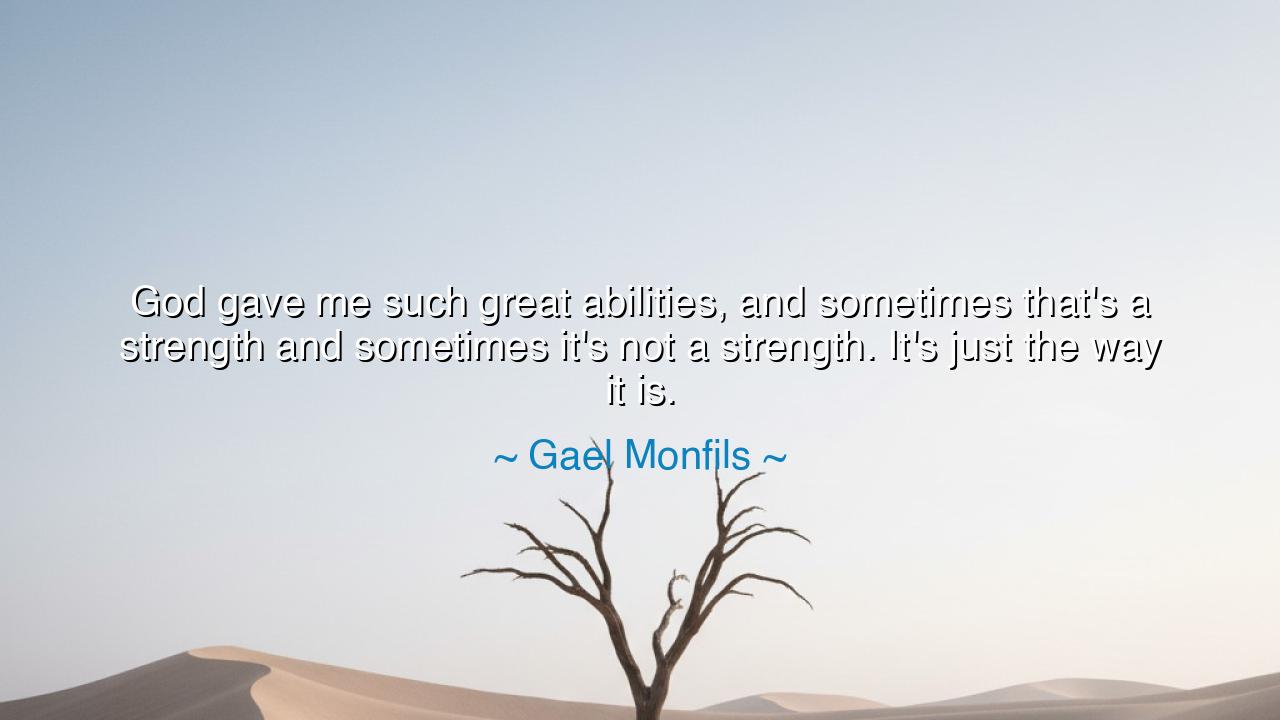
God gave me such great abilities, and sometimes that's a
God gave me such great abilities, and sometimes that's a strength and sometimes it's not a strength. It's just the way it is.






Hear, O seekers of wisdom, the words of Gael Monfils, the French master of the court, whose body leaps like lightning and whose spirit dazzles with play: “God gave me such great abilities, and sometimes that's a strength and sometimes it's not a strength. It's just the way it is.” These words, humble yet profound, remind us that the gifts bestowed upon us by heaven are double-edged. They can be our strength, lifting us to glory, yet they can also burden us, tempting us to rely too heavily upon what came easily instead of what is built through discipline and trial.
The origin of this truth lies deep within human history. Every gift, whether of mind, body, or spirit, carries within it both power and peril. The strong man may neglect wisdom, trusting too much in muscle. The brilliant mind may scorn patience, blinded by its own speed. The beautiful voice may falter when it forgets that song is more than sound, it is soul. Monfils, known for his extraordinary athleticism and agility, knew this well: his natural gifts allowed him to play with flamboyance and awe, yet at times these same gifts distracted him from discipline, consistency, and the harder road of steady endurance.
Consider the tale of Achilles, mightiest of the Greeks. His speed and strength made him nearly invincible, yet these very gifts nurtured his pride and his quick temper. It was not his weakness that destroyed him, but his unchecked reliance upon his strength. Likewise, Monfils’ reflection is not only about tennis, but about life: that which elevates us can also ensnare us, unless tempered with humility and wisdom.
Yet let us not despise the gifts we are given. For gifts are not chosen, but entrusted. Monfils speaks truth when he says, “It’s just the way it is.” The wise do not curse their blessings, nor boast of them, but recognize them as tools that must be wielded rightly. It is not the gift itself that determines greatness, but the heart and discipline of the one who bears it. Strength becomes true strength only when joined with humility, perseverance, and purpose.
O listeners, learn this: do not envy the gifts of another, nor despair if your own gift feels too heavy or too light. Every person has their share, whether seen or unseen. What matters is not how dazzling your gift appears, but how you nurture it. The seed of talent may fall into any soil, but only care, effort, and wisdom turn it into lasting fruit.
History gives us noble examples of this balance. Abraham Lincoln, not born with silver tongue or wealth, struggled with depression and doubt, yet by nurturing his gifts of empathy and persistence, he led a nation through its darkest hour. On the other hand, countless kings and warriors, born with every advantage, squandered their gifts through arrogance or folly. Their stories lie in ruins, while the humble and disciplined endure in memory.
Practical is this counsel: whatever your ability—whether great or small—do not lean on it as your crutch, nor despise it as your curse. Cultivate it with discipline. Pair it with virtue. Ask yourself daily: Am I using this gift to build, or to boast? Am I letting it lead me astray, or am I guiding it with wisdom? In this way, your gift will not become your downfall, but your path to true greatness.
Thus remember the words of Gael Monfils: “Sometimes that's a strength and sometimes it's not a strength. It's just the way it is.” Take them as both warning and encouragement. For gifts alone do not crown you with honor; it is how you wield them that writes your destiny. Accept your gifts, temper them with humility, and they will become not just your strength, but your legacy.






AAdministratorAdministrator
Welcome, honored guests. Please leave a comment, we will respond soon